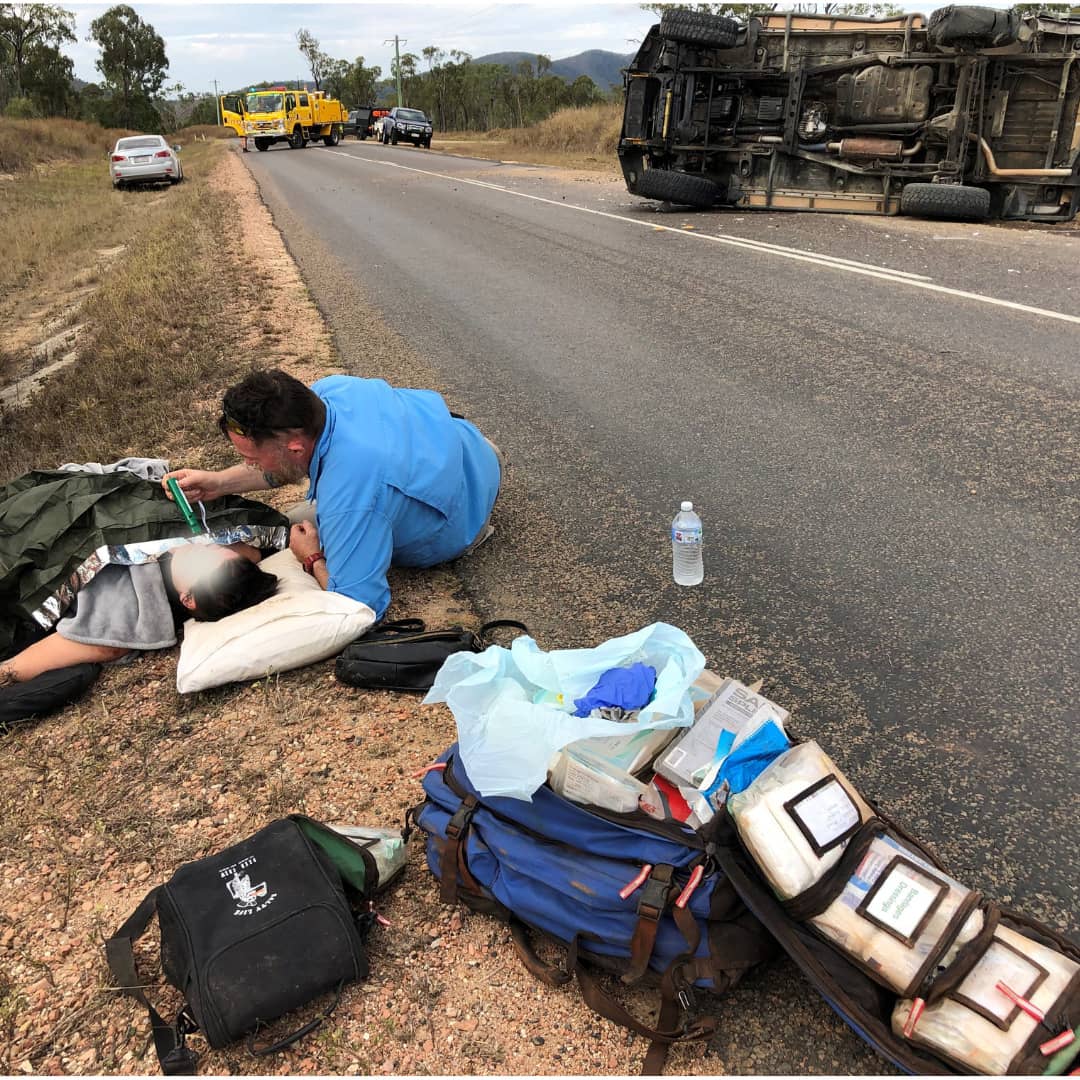
5 minute read
Responding in times of crisis:
Dr Alex Sleeman shares his story
What’s in this article
We speak with rural GP from Western Australia, Dr Alex Sleeman, about the importance of first responders in rural areas and what it takes to respond in times of crisis.

We are always grateful to all those courageous individuals who support and protect us in times of crisis, emergency and disaster.
Out in rural and remote communities, the distance from large hospitals means our first responders play an extra vital role.
One such individual who is no stranger to the courage and leadership needed in times of crisis is rural GP from Western Australia, Dr Alex Sleeman, who was the recipient of one of our free Emergency Trauma Kits known as Sandpiper bags.
He happened to be the first to the scene of a car accident, while driving with his family from Cape York to Townsville a couple of years ago. A Landcruiser had rolled at high speed after having blown a tyre, with three occupants inside.
Luckily, Alex was able to provide timely medical care using his Sandpiper bag, while they waited for an ambulance.
Rural communities need all the support they can get
One of the many ways Rural Doctors Foundation support rural communities is by providing medical equipment such as Sandpiper Bags to doctors like Alex.
Stories like this are just another reminder of why rural communities need all the support they can get and the important role of our rural first responders.
In recognition of ‘Thank a First Responder Day’ we interviewed Alex about his own work as a rural GP, the importance of Sandpiper Bags and what it takes to respond in times of crisis.
Q&A with Dr Alex Sleeman
Why are first responders so important, especially in rural areas of Australia?
Rural Australia is such a vast area, so help can take a long time to arrive. The first responders can make a huge difference to the outcome for a patient because of how long it will take to reach medical care.
Simply holding an airway open, or applying pressure to bleeding, can be the difference between a patient living or dying.
In rural areas of Western Australia, we rely heavily on volunteers to provide an ambulance service. Local people volunteer their time and expertise to attend medical incidents and provide the best care possible for patients, often with only basic first aid training. They do an amazing job, and in my local area I can recount so many success stories where the St John Ambulance (SJA) volunteers have saved people’s lives.
Anybody can step up to the role of a first responder. You may be the first on the scene of a car accident, or a major burn from a campfire, or a fall while rock climbing. There are so many scenarios where people can need medical help, and you might be the first person there. Having some basic first aid skills, and ideally a first aid kit, can make a really big difference.
I actually don’t consider myself as a first responder most of the time. I have certainly attended many a car accident, industrial accident or surfing injury, where I have provided care, but this has been opportunistic only. The true first responders for me (in WA) are those wonderful volunteers from St John Ambulance who are out doing this all the time.
How important is the Sandpiper Bag for emergencies?
The Sandpiper bag was amazing to have at the scene of the vehicle rollover. I was able to provide a higher level of care than would usually be possible – pain relief with a Penthrane whistle, splinting a broken arm and inserting IV lines.
This made it faster for the ambulance service to collect the patients as basic care had already been provided and the patients were ready to go. It also made the patients a lot more comfortable while awaiting the ambulance, which probably took 45 to 60 minutes to arrive.

Have you had to use the Sandpiper Bag since the accident?
The Sandpiper bag has been used many times since that accident, but only for minor issues. I take the bag whenever I drive long distances or go camping, so that I can assist if required. Since the vehicle rollover this has just been small dressings and the like.
I attend my children’s school camps as a parent volunteer and take the Sandpiper bag along. The first camp I attended, the camp host asked about having an Epipen for any children with anaphylaxis. Everybody breathed a sigh of relief when I mentioned I had the equivalent of 10 Epipens with me (I carry four to five vials of adrenaline in the bag). The camp host had no idea who I was, so he was a little confused as to why I had 10 Epipens. Luckily, I didn’t need to use any of them.
What are some of the characteristics of first responders?
I think the biggest characteristic that makes these people so amazing is the fact they are prepared to step up and have a go.
Many of these emergencies are quite confronting, with lots of blood or broken bones, or CPR being required, and many people would be scared and head in the other direction. But first responders step out of their comfort zone and work to make a difference.
Once the decision to step up has been made, I think the training then kicks in to follow a simple algorithm (like DRSABC) to save a life. Our volunteers with St John Ambulance come from all walks of life, with most having previously had no medical training, but they have all stepped forward to help and that’s what makes all the difference.
Similarly, I think lots of people, even those with medical training, drive past a car accident as they are too scared to get involved, or worried they will do something wrong. But having the guts to pull over and help is what makes all the difference.
Tell us a bit about yourself and your current work as a rural GP?
I came to medicine later in life after a career as a Clearance Diver in the Navy. I studied at Notre Dame in Fremantle, and then did my time as an intern and RMO (Resident Medical Officer) at Fremantle Hospital. I was considering a career in Emergency initially, but then decided to do some obstetrics at King Edward Hospital. I didn’t really enjoy this, so decided to do GP training. I did my training at a couple of practices in Perth, and then continued working in Perth once qualified, which I really enjoyed.
I always felt like I could do more as a GP, and I had read a lot of exciting stories about rural GPs on GPDU (a Facebook group) from a couple of rural GPs. I always kept my eyes out for rural GP jobs, but none of them were suitable for my wife’s work. One day I saw a job in Denmark (WA) advertised, so I had a chat with the clinic about it. I had been to Denmark on holidays and always loved it – the scenery is stunning and there is great fishing down there. My wife had just given birth to our third child and was on maternity leave, so we decided to move down and give it a try.
Working as a rural GP is very rewarding as you really get to know your patients as part of the community. You frequently look after three to four generations of the one family, which is not as common in the city. I also started working in the local hospital, providing on-call services for the Emergency Department and looking after inpatients.
Lauren Furey understands the joys and challenges of living in a rural community and believes that all Australians, regardless of location, deserve access to high-quality health services.
Related articles


